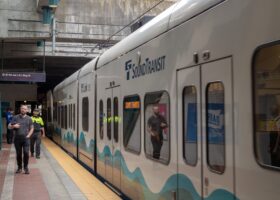New gas tax will make fuel prices far, far worse
March 23, 2022
Chances are you’ve experienced a bit of sticker-shock filling up your vehicle at the gas pump. While prices have risen in recent years, they’ve increased dramatically in the past few weeks due to ongoing global events.
Unfortunately, even if things calm down overseas the prices here in Washington are only going to get worse thanks to the new gas tax increase passed by the majority party in Olympia.
This isn’t a problem if you’re a wealthy, Tesla-driving legislator. But fuel increases hit the most vulnerable the hardest. Working class people who work in Seattle but can’t afford to live there must drive, and it’s those people who experience the greatest financial blow when prices go up.
Washington residents already have some of the most expensive gas prices in the country, which isn’t surprising considering it has one of the highest gas taxes of any state. When you go to fill up your car or truck, you pay 50 cents per gallon in state taxes, plus an additional 18 cents in federal gas tax.
That means that if you’re paying $4.70 per gallon right now, 68 cents of it cost comes from state and federal taxes.

However, unlike gas prices the taxes remain static regardless. If the price of gas were to drop down to $2 (knock on wood), you’re still paying 68 cents per gallon on taxes.
But that fixed amount is soon going to go up. A lot.
Last year, state lawmakers enacted SB 5126, which imposes a tax of $20.60 per metric ton (MT) of CO2. Fuel makes up almost half of all carbon emission in the state. An analysis by NERA Economic Consulting estimates SB 5126 will increase the cost of fuel in Washington starting in 2024 by 58 cents per gallon, with the revenue going to pay for the new transportation package. A less conservative estimate by NERA puts it at whopping $1.38 increase.
Naturally, state lawmakers who supported this bill aren’t exactly eager to be associated with it at a time of record-high fuel prices. They’re claiming that the new transportation package was funded without raising the gas tax.
In a strictly technical sense, they’re correct. The state’s official fuel tax wasn’t increased. But the state did pass legislation that generates revenue from fuel consumption at the consumer’s expense.
Consumers will be paying more at the pump while more money goes to Olympia. Unlike the state’s official gas tax, the carbon tax revenue can be used on anything legislators wanted.
In a recent piece titled “Fact check: State transportation budget raises taxes on gasoline,” Washington Policy Center Environmental Director Todd Myers dismantles the claims that the new transportation spending doesn’t come at the expense of your wallet at the gas station.
“Ultimately, the insinuation that the transportation package was funded without increasing taxes on gasoline is dishonest and, starting next year, Washington state drivers will pay the price,” he writes.
However, it gets even worse from there.
During the 2021 legislative session lawmakers also enacted a low carbon fuel standard that forces fossil fuel producers to buy credits from “clean energy” entities if their gas doesn’t meet increasingly lower carbon thresholds. Myers estimates that it will raise the price of gas by 17 cents over the next decade.
And yet…it gets even worse…
You won’t just pay more when you fill up at the pump. Anything you buy that is transported by truckers will also go up, because they also experience those additional costs. In fact, over 80 percent of all goods are transported via truck. In order to remain in business, those costs are passed on to their customers.
That means the cost of goods, services, and commodities you purchase at the store, restaurant, and other places will also increase accordingly.
Investopedia wrote last year that “when gas prices rise, it can be a drag on the economy—impacting everything from consumer spending to the price of airline tickets to hiring practices.”
Unless Real Change comes to Washington, we are going to see permanently high fuel costs that will make it only make it less affordable to live and operate a business here, especially for our low-income residents and those that need to travel long distances to work.




